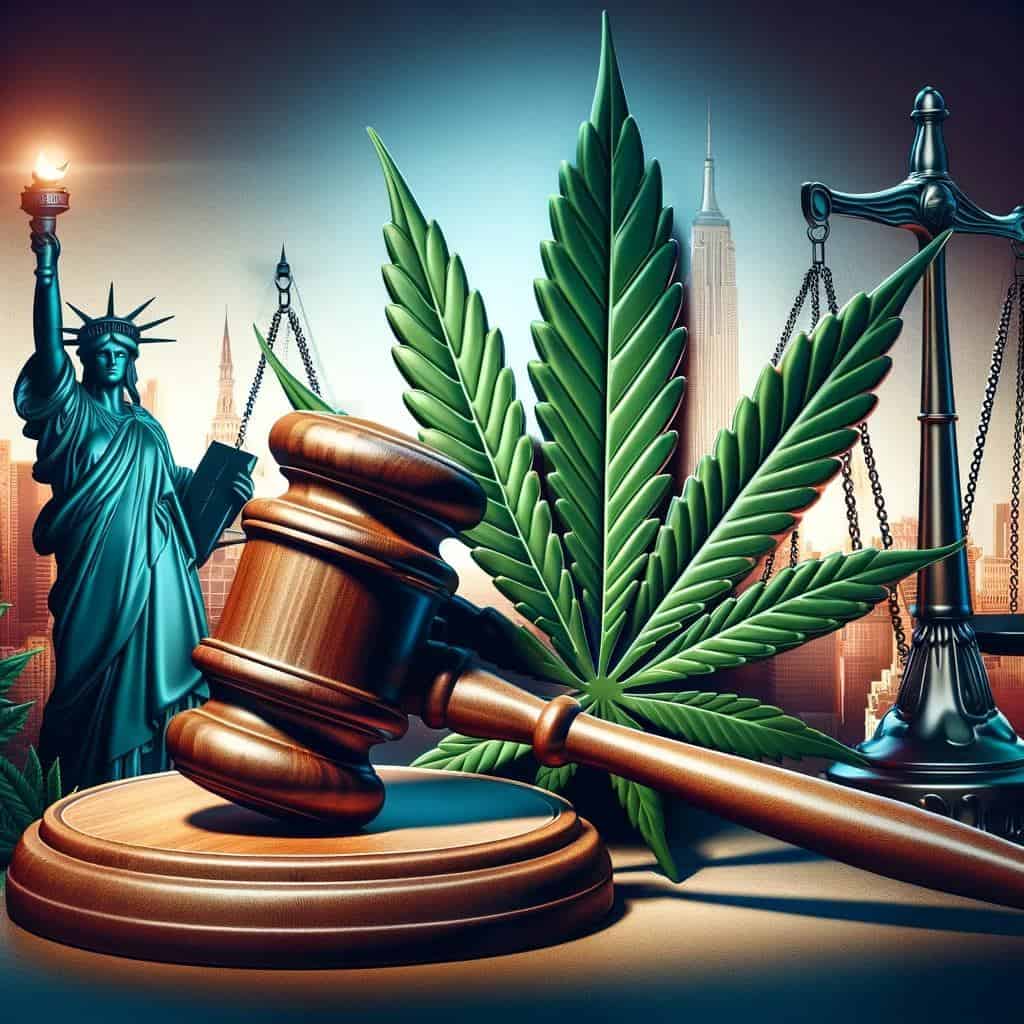Cannabis Law in New York
New York’s Marijuana Regulation and Taxation Act is a groundbreaking law shaping the cannabis industry, focusing on social justice, public health, and economic development. This blog provides an insightful overview of the law’s comprehensive approach, highlighting its impact on communities, businesses, and consumers in New York.
Medical Marijuana in New York

New York’s Marijuana Regulation and Taxation Act has revolutionized the state’s approach to cannabis, covering medical, adult-use, and cannabinoid hemp. This pioneering law focuses on social justice, public health, and economic development.
It includes a robust social and economic equity program, encouraging participation from communities affected by past prohibition policies. The law also ensures consumer safety through strict quality assurance measures in production, testing, and advertising.
Additionally, it fosters economic growth by supporting small businesses and farmers with new licensing opportunities. This blog offers a comprehensive overview of New York’s Cannabis Law, making it a must-read for understanding its multifaceted impact on communities, businesses, and consumers in the state.
What Is the Current Legal Status of Cannabis in New York?
The legal status of cannabis in New York is governed by the Marijuana Regulation and Taxation Act, which has established a comprehensive regulatory framework for the licensure, cultivation, production, distribution, sale, and taxation of medical, adult-use, and cannabinoid hemp within the state. This act represents a significant shift in New York’s approach to cannabis, encompassing various aspects of its use and regulation.
Medical Marijuana: In New York, medical marijuana is legal for patients who meet the eligibility. Registered patients can purchase medical cannabis products from dispensing facilities operated by registered organizations across the state. These facilities are regulated to ensure product safety and compliance with state standards.
Adult-Use Cannabis: The act also legalizes adult-use cannabis, allowing individuals to purchase and use cannabis recreationally. Adult-use retail dispensaries are regulated and licensed, and they must adhere to strict guidelines, including posting a dispensary verification tool near their main entrance.
Cannabinoid Hemp: The act includes provisions for the regulation of cannabinoid hemp, setting standards for its production and sale. This includes ensuring product quality and safety for consumers.
Social Equity and Economic Development: A key focus of the act is on social justice and economic development. It establishes a social and economic equity program to encourage participation from communities historically impacted by cannabis prohibition. The act also promotes the participation of small businesses and farmers in the cannabis industry, fostering economic growth.
How Do Regulatory Bodies Impact Cannabis Law in New York?
In New York, the regulation and oversight of cannabis, encompassing medical, adult-use, and cannabinoid hemp, are primarily managed by the Office of Cannabis Management (OCM).
This body plays a central role in implementing the Marijuana Regulation and Taxation Act, a comprehensive law that governs the licensure, cultivation, production, distribution, sale, and taxation of cannabis within the state.
Office of Cannabis Management (OCM): The OCM is responsible for administering a sophisticated quality assurance regulatory structure. This includes setting standards for production and manufacturing, conducting strict product testing, labeling, packaging, and advertising to ensure that cannabis products are safe for consumers and not targeted towards youth.
Cannabis Control Board: The Cannabis Control Board works in conjunction with the OCM and is charged with creating and implementing a social and economic equity plan. This plan aims to promote racial, ethnic, and gender diversity in issuing licenses and to encourage diversity in commerce, ownership, employment, and opportunities for social and economic equity in the regulated cannabis industry.
Cannabis Advisory Board: The Cannabis Advisory Board is another key entity involved in the oversight of cannabis in New York. This board provides guidance and recommendations to the OCM and the Cannabis Control Board on various aspects of cannabis regulation and policy.
The regulatory framework for Cannabis Law in New York is overseen by the Office of Cannabis Management, with the support of the Cannabis Control Board and the Cannabis Advisory Board. These bodies ensure that the state’s cannabis industry operates within a framework that prioritizes public health and safety, social justice, and economic development.

Who Is Eligible for Medical Marijuana in New York?
In New York, the eligibility for medical marijuana is no longer limited to a specific list of conditions. Healthcare providers who are registered with the state’s medical marijuana program have the discretion to certify patients for medical marijuana use.
This approach allows providers to determine whether a patient’s condition could benefit from medical marijuana based on their clinical judgment. This change has broadened access, making medical marijuana available to more patients who may benefit from its therapeutic uses. For more detailed eligibility criteria, individuals should consult with a registered healthcare provider.
What Are the Legal Limitations on Cannabis Possession in New York?
The legal limitations on cannabis possession in New York are an essential aspect of the state’s cannabis law, particularly under the Marijuana Regulation and Taxation Act.
However, the specific details regarding the possession limits for cannabis in New York were not directly available from the Office of Cannabis Management’s website. Generally, states with legalized cannabis have set guidelines that include:
- Possession Limits for Adults: States typically establish a maximum amount of cannabis that an adult can legally possess. This limit varies but is often set around one ounce (28 grams) for personal use.
- Medical Marijuana Possession Limits: For registered medical marijuana patients, the possession limits are usually higher compared to recreational users, reflecting the need for a continuous supply for medical purposes.
- Home Cultivation Rules: Some states allow adults to cultivate a limited number of cannabis plants at home for personal use. The specific number of plants permitted can vary.
- Public Consumption Restrictions: Even in states where cannabis is legal, there are often restrictions on public consumption. Laws typically require that cannabis be consumed in private residences or designated areas.
- Transportation Guidelines: There are usually specific guidelines for how cannabis can be transported within the state, such as requirements for it to be kept in a sealed container and not accessible while driving.
Which Regulations Govern Cannabis Cultivation in New York?
In New York, the cultivation of cannabis is regulated under the Marijuana Regulation and Taxation Act, which establishes a comprehensive framework for the licensure, cultivation, production, distribution, sale, and taxation of medical, adult-use, and cannabinoid hemp.
The Office of Cannabis Management (OCM) is responsible for overseeing these regulations, ensuring that all aspects of cannabis cultivation comply with state standards.
Licensing Requirements: The act stipulates that individuals or entities interested in cultivating cannabis must obtain a license from the state. This involves meeting specific criteria set by the OCM, including compliance with safety, quality, and operational standards.
Quality Assurance and Safety Standards: The OCM administers a sophisticated quality assurance regulatory structure, which includes standards for production and manufacturing. These standards are designed to ensure that cannabis products are safe for consumers and are produced under controlled conditions.
Social and Economic Equity Program: The act also establishes a social and economic equity program, encouraging participation from communities disproportionately impacted by cannabis prohibition. This program aims to promote diversity in the cannabis industry, including in the cultivation sector.
Cannabis Growers Showcase: The Cannabis Growers Showcase (CGS) initiative allows licensed cannabis growers and processors to showcase their products to consumers at events. This initiative provides an opportunity for cultivators to engage directly with the market and consumers.
How Are Cannabis Consumption and Legal Protections Addressed in New York?
In New York, the Marijuana Regulation and Taxation Act has established a comprehensive framework for the regulation of cannabis, which includes specific guidelines for consumption and legal protections for patients and providers.
This framework is overseen by the Office of Cannabis Management (OCM), ensuring that cannabis laws are implemented effectively and responsibly.
Cannabis Consumption Guidelines:
- Adult-Use Retail Dispensaries: Regulated and licensed dispensaries must adhere to strict guidelines, including posting a dispensary verification tool near their main entrance. This ensures compliance with state regulations and promotes responsible consumption.
- Medical Dispensaries: Registered patients in New York can legally purchase medical cannabis products from licensed dispensing facilities operated by registered organizations. These dispensaries are regulated to ensure product safety and compliance with state standards.
- Cannabis Growers Showcase: The Cannabis Growers Showcase (CGS) initiative allows licensed cannabis growers and processors to showcase their products at events, providing consumers with access to quality cannabis products.
Legal Protections for Patients and Providers:
- Social and Economic Equity Program: The act establishes a robust social and economic equity program to encourage participation from communities disproportionately impacted by cannabis prohibition. This program aims to address historical disparities and injustices associated with cannabis-related offenses.
- Quality Assurance and Safety Standards: The OCM administers a regulatory structure that includes standards for production, manufacturing, product testing, labeling, packaging, and advertising. This ensures that cannabis products are safe for consumers and not targeted towards youth.
- Economic Development Initiatives: The act encourages small businesses and farmers to participate in the cannabis industry, fostering economic growth through the creation of various license types, including microbusiness, cooperative, and delivery licenses.
What Economic Impacts Arise from Cannabis Taxation and Revenue in New York?
In New York, the economic impacts of cannabis taxation and revenue allocation are significant, as outlined by the Marijuana Regulation and Taxation Act.
This comprehensive regulatory framework oversees the licensure, cultivation, production, distribution, sale, and taxation of medical, adult-use, and cannabinoid hemp within the state. The Office of Cannabis Management (OCM) plays a pivotal role in administering these regulations.
Economic Development through Cannabis Industry: The act encourages small businesses and farmers to participate in the cannabis industry. This includes the creation of microbusiness, cooperative, and delivery license types, fostering economic growth and diversification in New York.
Revenue Generation and Allocation: The taxation of cannabis products contributes to state revenue. This revenue is then allocated to various state programs and initiatives, potentially including public health, education, and social services.
Social Equity and Community Reinvestment: A key aspect of the act is its focus on social justice and economic development. The robust social and economic equity program actively encourages participation from communities historically impacted by cannabis prohibition. This approach aims to ensure equitable distribution of the economic benefits derived from the cannabis industry.
Why Are Social Equity and Public Health Initiatives Important in Cannabis Law?
The Marijuana Regulation and Taxation Act in New York has placed a strong emphasis on social equity and public health initiatives, reflecting a comprehensive approach to cannabis regulation. These initiatives are crucial for addressing the historical and ongoing impacts of cannabis prohibition and ensuring public health and safety.
Social Justice and Equity:
- Addressing Historical Disparities: The act establishes a robust social and economic equity program, actively encouraging participation from communities disproportionately impacted by cannabis prohibition. This initiative aims to rectify the long-standing disparities and injustices associated with cannabis-related offenses.
- Promoting Diversity in the Industry: The equity program promotes racial, ethnic, and gender diversity in issuing licenses and encourages diversity in commerce, ownership, employment, and opportunities within the regulated cannabis industry.
Public Health and Safety:
- Quality Assurance and Consumer Safety: The act administers a sophisticated quality assurance regulatory structure, including standards for production, manufacturing, strict product testing, labeling, packaging, and advertising. These measures ensure that cannabis products are safer for consumers and not targeted towards youth.
- Educational and Preventive Measures: Public health initiatives focus on educating consumers about safe cannabis use and preventing misuse, particularly among minors and vulnerable populations.
Economic Development:
- Supporting Small Businesses and Farmers: The act encourages small businesses and farmers to participate in the cannabis industry, fostering economic growth and diversification. This includes the creation of microbusiness, cooperative, and delivery license types.
Recent Legal and Legislative Updates in New York’s Cannabis Law
Marijuana Regulation and Taxation Act (MRTA):
- Legalization of Adult-Use Cannabis: One of the most significant recent changes is the legalization of adult-use cannabis under the MRTA. This law, passed in 2021, marked a major shift in cannabis policy in New York, allowing adults 21 and older to legally possess and use cannabis.
- Expansion of Medical Marijuana Program: The MRTA also included provisions to expand the existing medical marijuana program, increasing the number of eligible conditions and easing restrictions on the types of products available to patients.
- Social Equity Provisions: The MRTA introduced social equity provisions aimed at addressing the disproportionate impact of cannabis prohibition on certain communities. This includes prioritizing licenses for minority-owned businesses and individuals from communities most affected by previous cannabis laws.
- Establishment of the Office of Cannabis Management: The act created the Office of Cannabis Management (OCM) to regulate and oversee all aspects of cannabis, including medical and adult-use, ensuring compliance with the new legal framework.
- Changes in Possession and Cultivation Limits: The law set new guidelines for the legal possession of cannabis and allowed for limited home cultivation for personal use, subject to specific regulations.
- Taxation and Revenue Allocation: The MRTA established a taxation structure for cannabis sales, with revenue allocated to various state programs, including education, community reinvestment, and drug treatment.
- Expungement of Previous Cannabis Convictions: The law includes provisions for the expungement of certain cannabis-related convictions, aligning with the state’s broader criminal justice reform efforts.
These updates represent New York’s progressive approach to cannabis regulation, balancing public health, social equity, and economic development. As cannabis laws continue to evolve, further legislative and regulatory changes are expected to refine and enhance the state’s cannabis policy framework.
How Can Individuals Stay Informed About Cannabis Law Updates in New York?
Staying informed about updates in cannabis law in New York is crucial for individuals, businesses, and healthcare providers involved in the cannabis industry.
The Office of Cannabis Management (OCM) plays a key role in disseminating information and updates regarding cannabis laws and regulations in the state. Here are some ways to stay updated:
- OCM Website and Updates: The OCM’s website is a primary source of information. Individuals can visit the site to read about the Marijuana Regulation and Taxation Act, understand the comprehensive regulatory framework, and find the latest updates on cannabis laws and regulations.
- Sign Up for OCM Updates: The OCM provides an option for individuals to sign up for updates. By filling out a form on their website, you can receive regular updates and notifications about changes in cannabis laws, regulations, and other relevant information.
- Participate in Public Forums and Events: The OCM’s External Affairs unit engages in tours and forums across the state, providing information and education on license types, application processes, and regulatory updates. These forums consist of presentations and Q&A sessions, offering an interactive way to stay informed.
- Social Media and Online Platforms: Following the OCM and related agencies on social media platforms like Facebook, Instagram, LinkedIn, Twitter, and YouTube can be an effective way to receive timely updates and news.
- Consulting with Legal and Industry Experts: Regular consultation with legal experts and industry advisors who specialize in cannabis law can provide insights into legislative changes and how they might impact your activities or business.
Staying informed about cannabis law updates in New York involves utilizing a variety of resources provided by the OCM, including their website, update sign-up options, public forums, social media, and professional consultations.
These resources ensure that individuals and entities involved in the cannabis industry are well-informed and compliant with the evolving legal landscape.
FAQs on Cannabis Law in New York
What is the current legal status of cannabis in New York?
Cannabis in New York is legally classified into three categories: medical marijuana, adult-use (recreational) cannabis, and cannabinoid hemp. Each category is regulated under specific guidelines and laws.
Who oversees the regulation of cannabis in New York?
The Office of Cannabis Management (OCM) is the primary regulatory body overseeing the licensure, cultivation, production, distribution, sale, and taxation of cannabis in New York.
Are there any social equity programs associated with New York’s cannabis law?
Yes, New York’s Marijuana Regulation and Taxation Act includes social and economic equity programs aimed at encouraging participation from communities historically impacted by cannabis prohibition.
Can individuals grow cannabis at home in New York?
New York law allows for limited home cultivation of cannabis for personal use, subject to specific regulations. The exact details of these regulations can be found on the OCM’s website or through legal advisories.
How does New York’s cannabis law address public health and safety?
The law includes a comprehensive quality assurance regulatory structure, which sets standards for production, manufacturing, product testing, labeling, packaging, and advertising to ensure consumer safety and prevent targeting youth.
Conclusion on Cannabis Law in New York
In conclusion, New York’s Cannabis Law, governed by the Marijuana Regulation and Taxation Act, represents a progressive and comprehensive approach to cannabis regulation. It legally classifies cannabis into medical, adult-use, and cannabinoid hemp categories, each under specific guidelines.
The Office of Cannabis Management (OCM) plays a crucial role in overseeing this multifaceted industry, ensuring compliance with safety, quality, and equitable practices. The law’s emphasis on social and economic equity programs demonstrates New York’s commitment to rectifying historical injustices associated with cannabis prohibition.
Additionally, the law’s focus on public health and safety reflects a balanced approach to cannabis regulation, aiming to protect consumers while fostering a responsible and sustainable industry. This legal framework marks a significant shift in New York’s stance on cannabis, paving the way for future developments in the industry.

A1 Marijuana Doctors is an online platform, that connects marijuana patients to marijuana doctors in their state.



